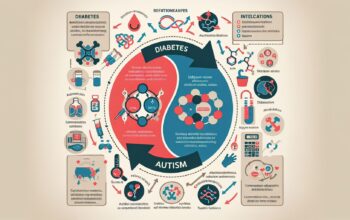Are you familiar with the two seemingly distinct conditions, autism and diabetes? You might be surprised to learn that several studies suggest a link between the two. According to recent research, children from mothers with type 1, type 2, or gestational diabetes are at a higher risk of autism. Intriguing, right? Navigating this connection can be challenging, so in this post, you will learn about the relationship between diabetes and autism, what it means for both children and adults, and ways to manage these conditions.
Diabetes: An Overview
Before delving into the connection with autism, it’s worthwhile to understand diabetes on its own. As reported by the American Diabetes Association, about 1.5 million Americans are diagnosed with diabetes every year. Diabetes is a metabolic disease characterized by high blood sugar levels, and it comes in various forms. The most prevalent types are type 1, type 2, and gestational diabetes, each with distinct characteristics and causes.
Type 1 Diabetes
Type 1 diabetes is an autoimmune condition that leads to the destruction of insulin-producing cells in the pancreas. This type typically starts in childhood; however, it can emerge at any age. Individuals with type 1 diabetes must take insulin daily to survive.
Type 2 Diabetes
Contrarily, type 2 diabetes is characterized by the body’s inability to use insulin effectively, a condition known as insulin resistance. It is the most common type of diabetes, most often diagnosed in adulthood but increasingly seen in children.
Gestational Diabetes
Gestational diabetes develops in some women during pregnancy due to hormonal changes that cause insulin resistance. While it usually resolves after giving birth, those who’ve had gestational diabetes have an increased risk of developing type 2 diabetes later in life.
What is Autism?
Autism, or autism spectrum disorder (ASD), is a developmental disorder that affects social interaction, communication, and behavior. According to the Centers for Disease Control and Prevention, one in every 59 children in the U.S. is diagnosed with ASD. While the precise cause of autism is unknown, it is likely due to a combination of genetic and environmental factors.
The Connection Between Diabetes and Autism
Recent studies have discovered a link between diabetes in mothers and the increasing chance of autism in their offspring. According to a study published in the journal, JAMA, children from mothers with type 1, type 2, or gestational diabetes that was diagnosed by 26 weeks of gestation had a higher risk of being diagnosed with autism.
While the reasons for this association are yet to be fully determined, researchers believe that high blood sugar levels could disrupt fetal brain development, leading to autism. Pregnant women with poorly managed diabetes often have high blood sugar, which could affect the baby’s brain development if it penetrates the placental barrier.
According to a 2018 study published in the Journal of Autism and Developmental Disorders, among roughly 420,000 children, those whose mothers had type 1 diabetes were more likely to be diagnosed with autism.
What This Means for Children and Adults
With these findings, it becomes crucial for women who have diabetes or are at risk to monitor and manage their blood sugar levels meticulously before and during pregnancy. Maintaining stable blood glucose levels can help to decrease the chance of developmental issues in their children.
Moreover, children from mothers with diabetes should be screened for developmental disorders like ASD in infancy, facilitating early interventions that can significantly improve their developmental outcomes.
For adults diagnosed with both conditions, life might seem more challenging. But understanding this link between diabetes and autism provides an opportunity for strategies to cope with, manage, and reduce the symptoms and risks associated with these conditions.
Management Strategies
For those diagnosed with diabetes, maintaining a healthy diet, regular exercise, and taking prescribed medications can help manage blood sugar levels. Continuous glucose monitoring (CGM) is also a practical tool that provides real-time readings, helping you maintain optimum blood glucose levels.
For those also dealing with autism, structure and routine can bring a sense of order and predictability. Therapies like Applied Behavior Analysis (ABA), occupational therapy, and speech therapy can also significantly improve a person’s adaptive skills and quality of life. Joining a support group can also provide emotional reinforcement and valuable advice from others in similar situations.
Wrapping it Up
Understanding the link between diabetes and autism is a growing area of interest in medical research. While it might seem overwhelming, remember that insight into these conditions opens the way for effective management strategies. Good diabetes control during pregnancy, early autism detection, intervention, and therapies can all result in a significantly improved quality of life. This growing knowledge emphasizes a holistic approach towards healthcare, revealing the interplay between physical and mental health. Such discoveries underscore the importance of simultaneous care and management of co-existing conditions for the wellbeing of individuals and society at large.




